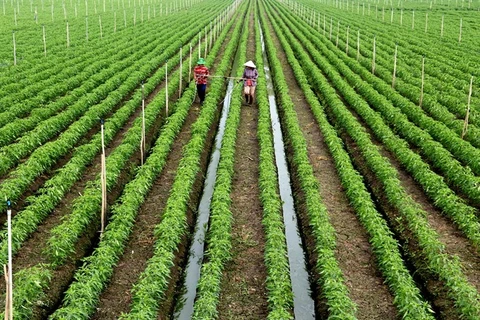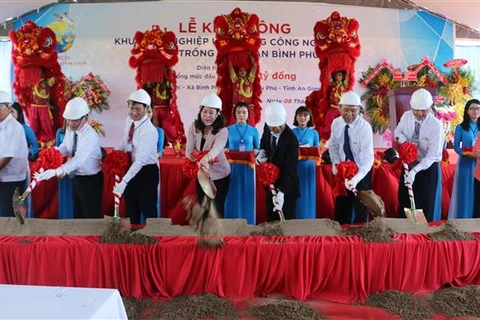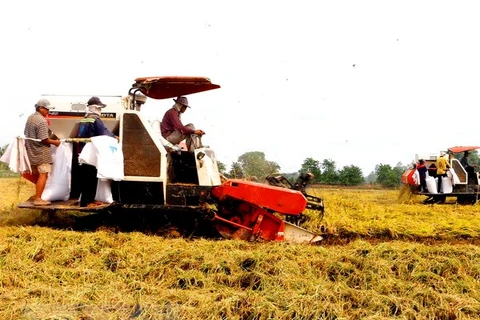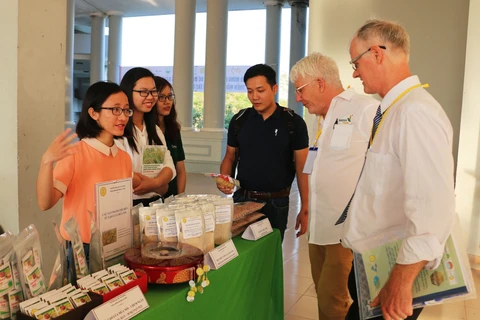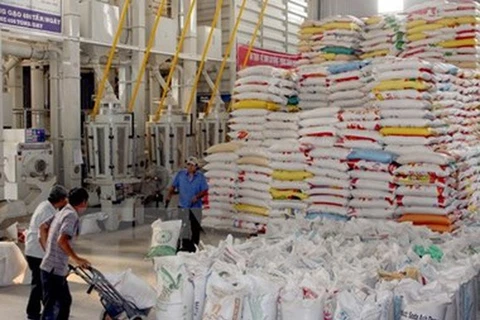HCM City (VNS/VNA) – Provinces and cities in the Mekong Delta have set ambitious targets this year with a focus on high-quality agriculture combined with eco-tourism, services and industry.
Last year, though the Delta faced unseasonable weather, flooding and a decline in agricultural product prices, the localities achieved positive socio-economic targets.
Located in a key economic region, with advantages in tourism, aquaculture and rice production, Kien Giang province, for instance, achieved an economic growth rate of 7.5 percent last year.
The province’s total Gross Regional Domestic Product (GRDP) reached more than 62.3 trillion VND (2.68 billion USD), and budget revenue collection 9.95 trillion VND (428.5 million USD), 7.7 percent higher than estimated.
Pham Vu Hong, Chairman of the Kien Giang People’s Committee, said in 2018 the province created 213 large-scale fields to help farmers apply technology to rice production.
The province produced more than 4.2 million tonnes of rice in 2018. At least 76 percent of high quality rice was exported, he said. The province’s aquaculture yielded about 815,400 tonnes, exceeding 4 percent of the plan.
It welcomed over 7.6 million visitors, of which international visitors were 580,000, exceeding 34.8 percent of the year’s plan, he added.
Nguyen Van Duong, Chairman of the provincial Dong Thap People’s Committee, said that export turnover of the province reached a record 1.2 billion USD last year, a surge of over 40 percent compared to the previous year.
The province sent more than 2,000 people to work overseas in Japan and the Republic of Korea, higher than the target of 1,000).
The province also focused on smart agricultural production, applying advanced technologies to ensure sustainable agriculture.
In addition, in 2018 Vinh Long province achieved 10.59 trillion VND (456.3 million USD) worth of agricultural production, according to the provincial People’s Committee.
The province’s investment environment improved with 22 new projects with total registered capital of 5.89 trillion VND (253.8 million USD), up by 10 projects over the same period.
The number of tourists to Vinh Long also increased by more than 8 percent over the previous year.
Tien Giang province also achieved good results in industry, export, tourism, rice production, and fisheries, among others.
Income per capita in Tien Giang increased to 47.6 million VND last year, exceeding the set target, which was higher than the average of the entire Mekong Delta region.
Le Quang Trung, Vice Chairman of the provincial Vinh Long People’s Committee, said this year Vinh Long planned to improve its growth models by increasing labour productivity and competitiveness.
The province plans to enhance cooperation activities among other localities in the region to develop its trade, service and tourism sectors.
Vinh Long will continue to restructure agriculture with the building of new rural areas, and focus on building value chains for production and promoting major agricultural products.
The provincial Kien Giang People’s Committee plans to improve the quality of human resources and administrative reforms, promote investment in major transport infrastructure, and develop Phu Quoc island district as a special economic zone and driving force of the province.
Kien Giang will also continue to restructure the agricultural sector with a focus on building new rural areas, and issue more incentives to attract investment in clean and organic agriculture.
The province will enhance investment promotion and recover delayed projects or those that have been implemented slowly.
Kien Giang aims to achieve a growth rate of more than 7.8 percent, the top figure in the Mekong Delta region.
In addition, Soc Trang will also improve its business environment and promote agricultural development with linkages to value chains, with priorities given to clean rice and aquatic products, use of high technologies, and promotion of tourism and renewable energy.
Soc Trang targets a growth rate of between 7.3 percent and 7.5 percent this year, with income per capita of more than 42 million VND.
It will continue to reduce the rate of poor households in the Khmer community people to 3-4 percent per year.
Vo Thanh Thong, Chairman of the Can Tho City People’s Committee, said Can Tho is playing a major role in the Mekong Delta in many fields such as education and training, healthcare, science and technology, industry, trade, services and tourism.
Can Tho will continue to reform its growth model, restructure the economy towards sustainable development, and promote administrative reform, as well as create more favourable conditions for local and foreign enterprises to operate effectively. Can Tho will also promote a knowledge-based economy.
The Mekong Delta accounts for 12 percent of the national area and 19 percent of its population. It contributes 50 percent of the rice crop, 65 percent of aquaculture, 70 percent of fruit, 95 percent of exported rice and 60 percent of exported fish.-VNS/VNA
VNA

